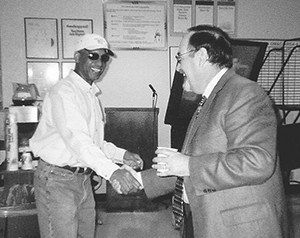
Business Manager Perry Zimmerman greets Lineman Marshall Williams in PG&E’s Kern Division in 2002. Zimmerman visited some 200 work places during his first year in office. IBEW 1245 Archive
As business manager, Perry Zimmerman visited hundreds of worksites and insisted that his staff be visible as well. He consciously downshifted relations with the top brass at PG&E and focused on strengthening the union’s traditional bargaining relationship with PG&E’s Department of Industrial Relations. He named staff attorney Tom Dalzell, an experienced negotiator, as Senior Assistant Business Manager.
During the first 16 months of Zimmerman’s term, IBEW 1245 beat back three attempts by public power activists to engineer a municipal takeover of PG&E’s assets in San Francisco. IBEW 1245 had no objection in principle to municipal ownership, but opposed needless changes in ownership that threatened members’ livelihoods.
In early 2004, Zimmerman warned that service reliability was again at risk, and told PG&E officers they should prioritize staffing and training. Tom King, PG&E’s new Chief of Utility Operations, ignored this advice and launched a massive restructuring of the company instead. Over the next three years PG&E spent a billion dollars on “Business Transformation,” with a focus on consultant-driven consolidation, automation and downsizing. It was a massive failure, further evidence of an industry knocked out of joint by the long deregulation fiasco.
In 2002, Zimmerman and the Executive Board finalized plans to move the union hall to Vacaville. Ronald T. Weakley Hall was opened in October of 2003 with Weakley himself in attendance.
Zimmerman was re-elected as business manager in 2004 by a comfortable margin, but resigned in mid-2006. The Executive Board appointed Dalzell to finish out Zimmerman’s term.